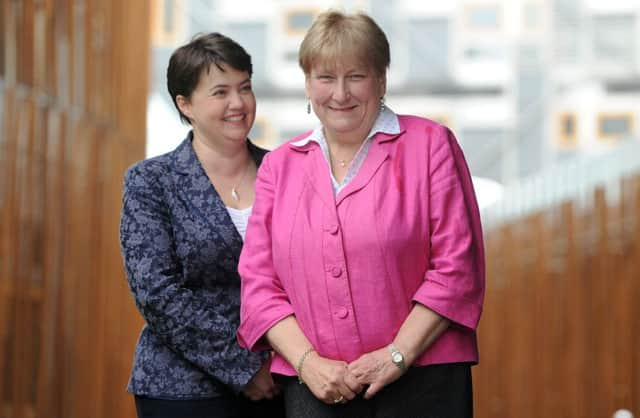Brian Monteith: Tory revival in Scotland?


While it is understandable that Jeremy Corbyn’s election as Labour leader should dominate the headlines, something is stirring inside the Scottish Conservatives that could be just as seismic to our native political culture. Could there yet be a Tory revival north of the border?
Seven of the fifteen Tory MSPs are retiring and a new wave of fresh faces and thoughtful minds are about to prostrate themselves before the electorate – not least Professor Adam Tomkins, who recently announced his candidature. With the nationalists looking to sweep all before them, Labour has little time to gather itself and become electable again on 5 May next year. Can Ruth Davidson and her party take advantage of Labour’s disarray and become the main opposition to Nicola Sturgeon?
Advertisement
Hide AdAdvertisement
Hide AdAnd from a position as the main opposition would that not place them, at the very least, as king-makers for any new administration that forms four years hence in 2020? Surely the SNP cannot go on for ever, observers wonder; even the SNP leadership must know there will be a time when they will fall back and be replaced. Manoeuvring to be the natural opposition at the right time will be the goal of both Labour and the Conservatives. If that jockeying were to be won by the Tories, it would be nothing short of fantastic in its true sense. But is it possible?


Opinion polling suggests it is an outlandish thought, with two recent samples varying between an appalling 11 per cent and a respectable 15 per cent on the list vote. Remember though that the Conservatives only managed 13.9 per cent in the real list vote in 2011 – anything above that will be hailed as some sort of recovery.
Labour’s Corbyn and Dugdale are planning to pin their hopes on presenting a more left-of-centre stance both at Westminster and in Holyrood. Dugdale’s talk of higher personal taxes for high earners and removing charitable status of independent schools is only the beginning as she seeks to become more radical than Sturgeon. But even if this is successful in drawing votes back from the SNP, Labour’s left turn must surely create room in the centre for the Conservatives to grow. The question is, can they capitalise on the opportunity and overtake Labour?
The party is in some respects re-invigorated after two redoubtable campaigns in the Scottish referendum and recent general election. Ruth Davidson was regularly mentioned in dispatches and Conservatives showed greater positivity and confidence about defending the union than their reluctant allies in the Labour Party. True, the general election could and should have delivered better results for the party, not least because any tactical voting in support of unionist candidates and against the SNP should have helped Tories do well.
The Holyrood elections offer a more propitious context, for any electoral unpopularity by association with the Conservative government should count for less where the decisions that affect our education, healthcare and infrastructure are made in Scotland – and be balanced out by some electoral appreciation of an economic recovery that has brought over 1.4 million new jobs at a cost of far less pain than other EU countries ridden with large levels of public debt. If that counts for nought the question has to be asked, why?
Scottish Tory policies – such as the willingness to cut taxes separately in Scotland – are necessarily shaped and agreed in Scotland and the party administration operates wholly independently from London.
Its recent convention agreed to open up the ranking process for the list seats beyond party members – which number fewer than 12,000 – to pledges that number some 200,000. Such democratic participation helps invigorate activism and binds in support. All but a handful of the constituency candidates are in place and final selections should be completed by this time next week. With seven MSPs retiring next year, fresh blood that never knew a day Margaret Thatcher was Prime Minister can honestly make the claim to carry less of the baggage that reputedly makes the party unelectable for too many Scots.
The decision by Professor Tomkins to contest the Scottish parliament elections is especially good news for the Conservative Party, although not all of its members saw it that way. It was a pity that Glasgow Councillor David Meikle decided to withdraw from the contest; after all it was only the decision by his leader Ruth Davidson to seek election under the Lothians list that opened up the possibility of him moving into the top ranking for Glasgow. He might well have beaten Tomkins in the coming ranking contest but if he truly believed he couldn’t, there would have been no disgrace in seeking election further west where Annabel Goldie is retiring.
Advertisement
Hide AdAdvertisement
Hide AdTomkins has the calibre of mind that the parliament badly needs, never mind the Conservatives, and were he to retain Davidson’s current place on the Glasgow list, we should expect him to quickly become influential. Why wait – there should be a role for him in campaign debates.
If, when the votes are counted, Ruth Davidson is unable to deliver a larger group then where can the Conservatives turn? The party will have tested to destruction the idea that all it needed was a brighter, smarter, younger, more likeable leader who goes against the stereotype of a party for the strait-laced middle classes or the minor blue-blooded county set. It will have claimed to have rebranded, left behind its baggage from the past and become more identifiably Scottish; and yet it will still have been rejected. Despite one more heave, it will have retreated further; despite shouting louder, it will have been ignored.
Maybe then counsel will be sought to ask if it is indeed time to start all over again with something altogether fresh and new. There will be no new right-of-centre party before May next year, but there could still be a need for one if the party fails once more.